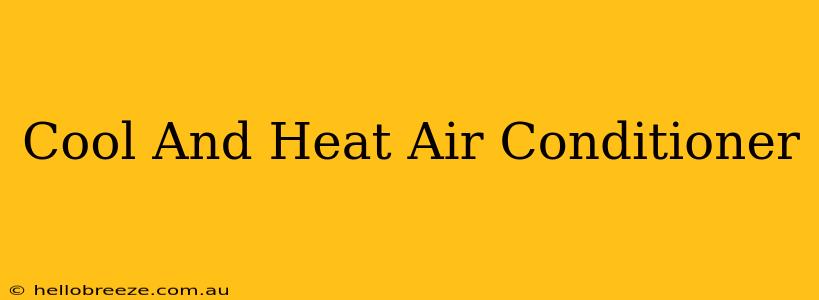Choosing the right air conditioner can significantly impact your comfort and energy bills. This guide explores the benefits of cool and heat air conditioners, helping you decide if this versatile option is right for your home.
What is a Cool and Heat Air Conditioner?
A cool and heat air conditioner, also known as a heat pump, offers both cooling and heating capabilities in a single unit. Unlike traditional systems that require separate air conditioners and furnaces, heat pumps utilize a refrigerant cycle to move heat rather than generate it. This makes them a highly efficient and cost-effective solution for year-round climate control.
How Do Cool and Heat Air Conditioners Work?
During the summer months, the heat pump absorbs heat from inside your home and transfers it outside, providing cool air. In winter, the process reverses. The unit extracts heat from the outside air (even in cold temperatures) and transfers it inside, providing warmth.
Advantages of Cool and Heat Air Conditioners
-
Energy Efficiency: Heat pumps are renowned for their high energy efficiency ratings (SEER and HSPF). They often consume less energy compared to separate cooling and heating systems. This translates to lower energy bills and a smaller carbon footprint.
-
Cost Savings: While the initial investment might be slightly higher than buying separate units, the long-term savings on energy costs often make heat pumps a financially sound choice.
-
Space Saving: A single unit handles both heating and cooling, eliminating the need for separate equipment and freeing up valuable space.
-
Quiet Operation: Many modern heat pumps operate quietly, ensuring a peaceful environment in your home.
-
Improved Indoor Air Quality: Some models incorporate air filtration systems, enhancing indoor air quality and reducing allergens.
Factors to Consider When Choosing a Cool and Heat Air Conditioner
-
Climate: Heat pumps are most effective in milder climates. Their efficiency can decrease in extremely cold conditions.
-
Home Size: The size of your home will determine the required BTU (British Thermal Unit) rating of your heat pump. Incorrect sizing can lead to poor performance and increased energy consumption.
-
Installation: Professional installation is crucial for optimal performance and efficiency.
-
Budget: Consider both the initial purchase cost and the long-term energy savings.
-
Features: Explore different features such as smart home integration, programmable thermostats, and advanced filtration systems.
Cool and Heat Air Conditioners vs. Traditional Systems
| Feature | Cool and Heat Air Conditioner (Heat Pump) | Traditional System (Separate AC and Furnace) |
|---|---|---|
| Energy Efficiency | Higher | Lower |
| Cost (Long-term) | Lower | Higher |
| Space | Less space required | More space required |
| Installation | More complex | Simpler |
| Climate Suitability | Best for milder climates | Suitable for various climates |
Maintaining Your Cool and Heat Air Conditioner
Regular maintenance is key to ensuring the longevity and efficiency of your heat pump. This includes:
- Annual professional inspections: A qualified technician can identify and address potential issues early on.
- Air filter changes: Regularly changing the air filters improves airflow and efficiency.
- Coil cleaning: Keeping the coils clean prevents buildup and ensures optimal heat transfer.
By carefully considering the factors discussed above and investing in proper maintenance, you can enjoy the benefits of a cool and heat air conditioner for years to come, experiencing both comfort and significant energy savings. Remember to consult with HVAC professionals for personalized advice tailored to your specific needs and climate.

